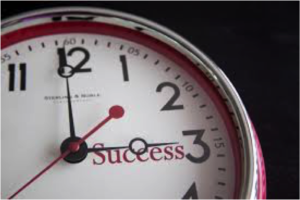 Do you ever end the work day and, in a befuddled sort of way, ask yourself where your time went? If your answer is yes, you are not alone. One of the biggest challenges to creating wellbeing in our work and in our lives is our habit of letting time slip away without really knowing where it is being spent. The old saying is true: “The more you do of what you are doing, the more you’ll get of what you are getting”.
Do you ever end the work day and, in a befuddled sort of way, ask yourself where your time went? If your answer is yes, you are not alone. One of the biggest challenges to creating wellbeing in our work and in our lives is our habit of letting time slip away without really knowing where it is being spent. The old saying is true: “The more you do of what you are doing, the more you’ll get of what you are getting”.
Think about this: everything you do, all day long, either will help you move toward your goal or will hinder you from reaching your goal. If you want better results, you’ve got to change the way you are using your time. The way to move closer to balancing work and life is to analyze your choices about what you are using your time for.
A great place to begin analyzing where our time is going is to look at our daily habits. Habits determine what we do every day. Some habits are helpful and others are not. Habitual behavior uses a great deal of our time. Some habits we are aware of. Others we are, unfortunately, clueless about. Drinking a cup of coffee every morning is a habit for me. If I am totally honest about it, one cup of coffee can take up 30 minutes or more of my time, especially if I am ordering it at my favorite coffee shop. When looking at spending more time with important activities, this could be one area to explore.
A second area to examine are time choices. What are the choices that you control about how to use your time? If you are an entrepreneur you may get many time-choice opportunities each day. If you work for someone else your time choices may be limited to evening and weekend activities. You may spend six hours each Saturday playing golf. Is that a good way to spend your time?
An excellent way to take a closer look at time patterns is to keep a time log. A time log is a journal of every daily activity and the amount of time you spent on each. Use your time log to track what you do, when you do it and why you do it for one week and then review it. The results can be quite eye-opening and may lead you to make necessary time changes.
I was involved as a volunteer board member and knew that I was giving this organization too much time. However, once I looked at my time log I was shocked to see just how much time the board position and all of the internal communications were eating. The evidence suggested that I needed to make a change.
A wise person once said, “It is not enough to know; you must act. Knowledge without action is powerless.” Recognize your habits and how you spend your discretionary time. Then create and execute a plan to bring balance into your work and life. Your return on invested time will be well worth it.











